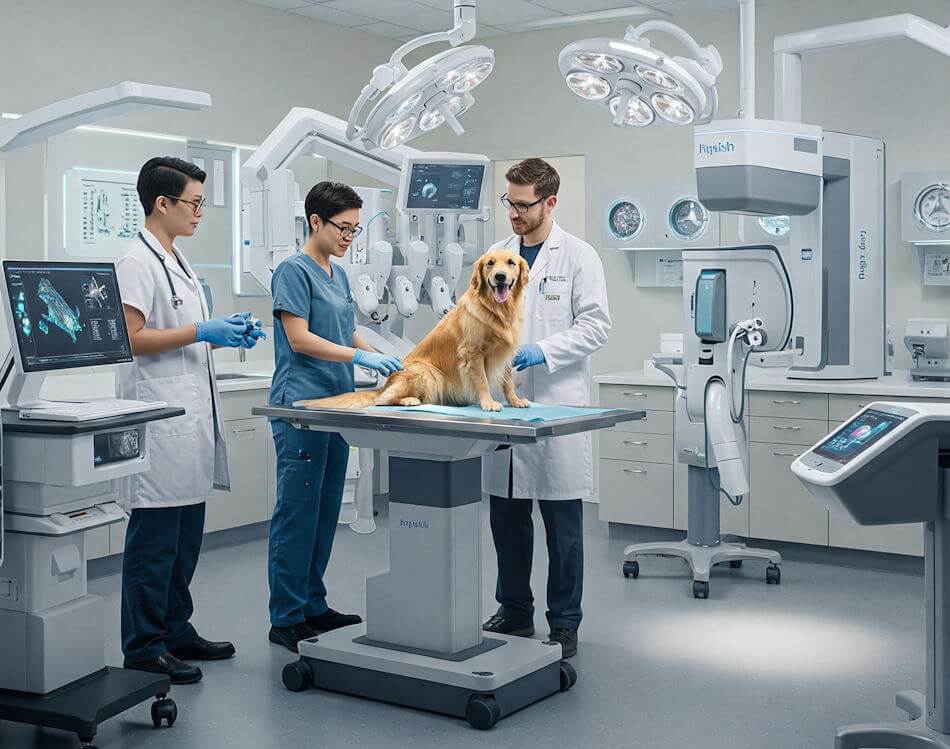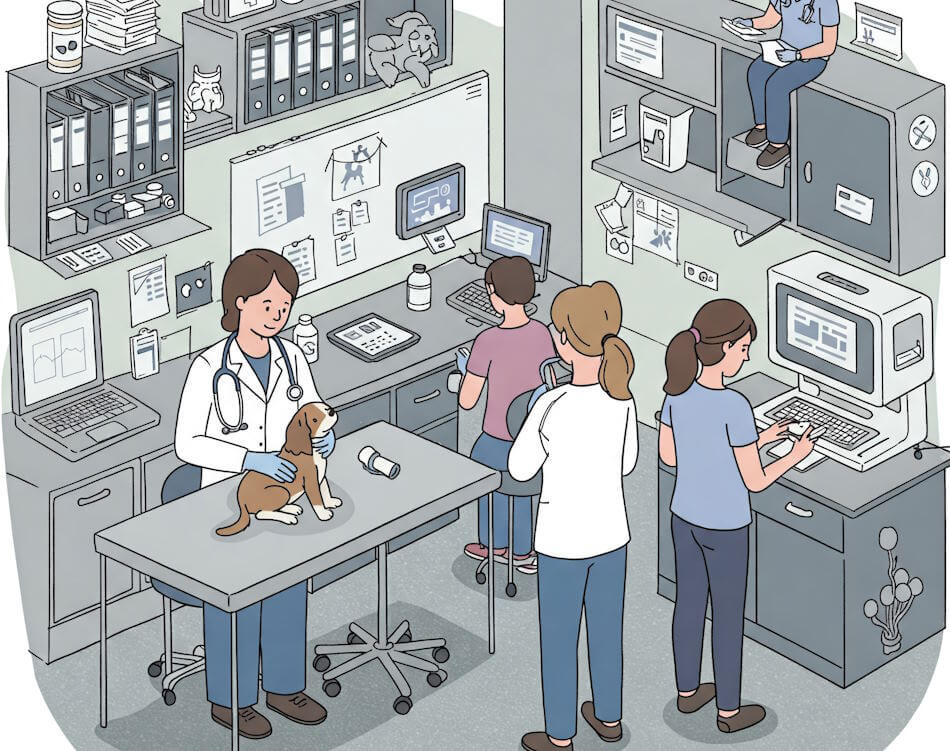In today’s digital landscape, online reviews have emerged as a pivotal element in the decision-making process for consumers, particularly in the veterinary sector. With the advent of the internet, potential clients increasingly rely on the experiences of others when selecting a veterinary service. The rise of social media platforms and dedicated review websites has democratized access to information, allowing pet owners to make informed choices based on feedback from fellow pet lovers.
Consequently, veterinary businesses must recognize that their online reputation can significantly impact their success. A wealth of positive online reviews can attract new clients, while negative feedback can deter potential customers. This transformation in consumer behavior necessitates that veterinary practitioners embrace active reputation management strategies. Monitoring and responding to reviews not only helps improve visibility in search results but also fosters trust and credibility among pet owners.
Furthermore, online reviews serve as a crucial touchpoint in the client-veterinarian relationship. Pet owners often share their experiences regarding the quality of care, staff professionalism, and overall satisfaction with the services provided. This feedback can aid veterinary businesses in identifying strengths and areas for improvement, ultimately enhancing the overall client experience. As the veterinary industry continues to evolve, adapting to these contemporary methods of communication and feedback will be essential for sustained growth and improved client retention.
In conclusion, online reviews play a fundamental role in shaping the veterinary landscape, influencing potential clients’ choices and highlighting the need for robust reputation management in this sector. Embracing these reviews and responding thoughtfully can lead to increased trust and business success in an increasingly competitive market.
Understanding Consumer Behavior in Veterinary Services
The search for veterinary services is increasingly shaped by the behaviors and preferences of pet owners, particularly as technology continues to evolve. Today’s consumers are more inclined than ever to turn to online platforms for information before making decisions regarding their pets’ healthcare needs. A recent survey indicated that over 80% of pet owners cite online reviews as a crucial factor in their selection of a veterinary clinic. This statistic underscores the importance of managing an effective online presence for veterinary businesses.
Demographic trends reveal a significant shift towards younger pet owners, who predominantly utilize digital technology for research purposes. Millennials and Generation Z make up a substantial portion of the pet owner market and are particularly reliant on online reviews to inform their choices. These groups are not only tech-savvy but also seek transparency and authentic perspectives, often turning to social media platforms, Google, and specialized review websites to gather insights about veterinary services. This behavior highlights an evolving landscape where traditional marketing strategies may fall short in reaching modern consumers.
The data reflects a growing reliance on peer reviews rather than solely on the marketing claims of veterinary practices. Consumers are likely to trust the experiences of fellow pet owners over promotional messages from businesses. Therefore, veterinary practices must actively encourage satisfied clients to leave positive feedback online. Moreover, responding to reviews, both negative and positive, can significantly impact potential clients’ perceptions. A well-managed online reputation can lead to increased client loyalty and attract new customers, ultimately contributing to the success and growth of veterinary services in a competitive marketplace.
The Role of Trust in Veterinary Care Decisions
Trust is a critical component in the decision-making process for pet owners seeking veterinary care. Given the emotional investment and attachment owners have with their pets, the choice of a veterinary practice is not taken lightly. Online reviews significantly influence this trust dynamic, serving as a direct reflection of a veterinary clinic’s reputation and the quality of care it provides. When potential clients read positive reviews from satisfied customers, they are more likely to feel confident in choosing that practice for their pet’s health needs.
Positive online reviews can enhance trust by showcasing various aspects of a veterinary practice, such as the professionalism of the staff, the effectiveness of the treatment, and the overall experience of other pet owners. When potential clients encounter numerous favorable testimonials, they are reassured that their pets will be in safe and competent hands. This testimony provides a level of social proof that can sway decisions, demonstrating the importance of maintaining a robust online presence.
Conversely, negative reviews can have a detrimental impact on a veterinary business’s reputation. Instances of dissatisfaction, whether due to perceived poor service, miscommunication, or inadequate care, can deter prospective clients from selecting a particular clinic. In today’s digital age, negative feedback can travel quickly and broadly, often leading to a decline in clientele. Therefore, it is imperative for veterinary clinics to actively manage their online reputation by addressing concerns promptly and professionally. Engaging with clients, responding to reviews, and implementing feedback can positively affect trust levels and encourage new clientele to consider their services.
Ultimately, trust plays a crucial role in pet owners’ choices regarding veterinary care. Via positive online reviews, veterinary practices can build, reinforce, and maintain this essential trust, which is vital for sustaining a thriving business.
Impact of Online Reviews on Business Growth and Client Retention
In the contemporary digital landscape, the role of online reviews cannot be understated, especially for veterinary businesses. Reviews act as a reflection of the client’s experience with a service provider, and their influence on business growth is multifaceted. Positive feedback from satisfied clients can significantly enhance a veterinary practice’s reputation, leading to a marked increase in appointment bookings. Prospective clients often rely on online reviews when selecting a veterinarian, as these testimonials provide insight into the quality of care and customer service they can anticipate.
The correlation between high ratings in online reviews and financial success is well-documented. Research indicates that a veterinary business with a higher average star rating can experience a surge in new clients, as many consumers perceive more positive feedback to signal a reliable and trustworthy service. Furthermore, existing clients who perceive the quality of care as positive are likely to maintain their loyalty to the practice, resulting in repeat visitations and a stable revenue stream. This loyalty not only contributes to financial stability but also fosters long-term relationships between veterinarians and pet owners, creating a supportive community around the practice.
Conversely, negative reviews can jeopardize a veterinary business’s financial health. Unsatisfied clients are quick to express their grievances online, which can deter potential customers from choosing that practice. A single unfavorable review can resonate and influence multiple prospective clients, leading to decreased appointment bookings and ultimately resulting in financial loss. Therefore, it becomes imperative for veterinary practices to actively manage their online reputation by encouraging satisfied clients to share their experiences while also addressing and resolving any negative reviews promptly. The proactive management of online reviews is essential to ensure sustained growth and client retention in the competitive veterinary sector.
Strategies for Encouraging Positive Reviews
Online reviews play a crucial role in shaping the reputation of veterinary businesses. Satisfied clients who share their positive experiences can attract new customers and strengthen the practice’s image. Thus, developing effective strategies to encourage clients to leave favorable reviews is essential. One of the most effective methods is to request feedback shortly after a visit. This can be accomplished through follow-up emails or text messages, thanking the pet owners for their visit while gently prompting them to share their experiences online. It is important to ensure that the requests are personalized to foster a sense of connection.
Another approach is to incentivize reviews while ensuring it adheres to ethical guidelines. For instance, offering small rewards, such as discounts on future services or products, can motivate clients to take the time to express their satisfaction. However, it is imperative to clarify that clients should only leave reviews based on their genuine experiences, thus maintaining authenticity in feedback. Establishing clear guidelines helps ensure that the focus remains on collecting honest opinions rather than soliciting solely positive comments.
Additionally, simplifying the review process can significantly influence the likelihood of clients leaving feedback. Veterinary businesses can provide direct links to their review platforms in emails or SMS messages, making it straightforward for clients to participate. Providing clear instructions on how to leave a review can also ease any uncertainties that clients may have about the process. Ensuring that the review platforms are mobile-friendly will further enhance accessibility.
Finally, acknowledging and responding to reviews, both positive and negative, demonstrates to clients that their opinions are valued and respected. This engagement not only encourages further feedback but can also foster a stronger connection between the veterinary practice and its clients. By implementing these strategies, veterinary businesses can build a robust online reputation through positive reviews, ultimately benefiting their practice in numerous ways.
Dealing with Negative Reviews: Best Practices
Negative reviews, while challenging, can serve as a valuable tool for veterinary businesses to refine their services and enhance customer satisfaction. The first step in addressing negative feedback is to respond promptly; timely responses indicate to clients that their concerns are taken seriously and that the practice values their input. A prompt reply can often diffuse tension and prevent further dissatisfaction.
When addressing negative reviews, it is crucial to maintain a professional and empathetic tone. Acknowledge the reviewer’s feelings and express genuine concern for their experience. This approach not only helps in calming disgruntled clients but also showcases your practice’s commitment to customer service. For instance, expressing regret that the service did not meet expectations can demonstrate empathy, which is vital in maintaining trust with existing and potential clients.
Moreover, transforming a negative experience into a positive outcome is an art that veterinary businesses can master. By inviting the reviewer to discuss their concerns privately, you create an opportunity to rectify the situation. This could involve offering a solution, such as a follow-up consultation or a discount, which not only addresses the immediate issue but also demonstrates your commitment to improvement. Such proactive measures can lead to customers reconsidering their negative stance and possibly revising their initial review, which can benefit the overall reputation of the practice.
Lastly, negative reviews can provide invaluable insights into areas where your veterinary business may need improvement. Analyzing the feedback constructively allows practices to identify patterns or recurring issues. By implementing changes based on this input, veterinary businesses can enhance services, thereby reducing the likelihood of similar reviews in the future. Embracing negative reviews as a chance for growth can ultimately lead to a stronger, more successful practice.
Leveraging Online Reviews for Marketing Purposes
Online reviews play a pivotal role in shaping the perception of veterinary businesses. Given the increasing reliance on digital platforms for information, practices can strategically leverage these reviews to enhance their marketing efforts. One effective method is to feature positive testimonials prominently on the business website. By creating a dedicated section for client feedback or integrating reviews into service pages, veterinary practices can build trust with potential clients, showcasing their commitment to quality care and client satisfaction.
Moreover, social media platforms serve as an ideal venue for promoting outstanding reviews. By sharing testimonials on platforms like Facebook, Instagram, and Twitter, practices can utilize the power of word-of-mouth marketing. Engaging visuals, such as images of happy pets and their owners alongside glowing reviews, can capture attention and encourage sharing, effectively expanding reach. Additionally, encouraging satisfied clients to leave public reviews can generate fresh content that highlights the practice’s dedication to excellent service and reinforces its brand identity.
A unique selling proposition (USP) can also emerge from a practice’s online reviews. When potential clients observe that a veterinary business consistently receives commendations for specific services, such as compassionate care or advanced treatment options, they are more likely to choose that practice over competitors. In this way, testimonials can serve not only as endorsements but also highlight areas where the practice excels, ultimately driving client acquisition and retention.
Incorporating client feedback into marketing strategies transforms reviews into a powerful tool for distinction in the competitive veterinary landscape. By actively managing and promoting these online testimonials, veterinary practices are better positioned to attract new clients while solidifying relationships with existing ones, all through the strategic use of online reputation.
Monitoring and Managing Online Reputation
In today’s digital age, veterinary businesses must recognize the significance of monitoring their online reputation. With the proliferation of platforms where customers can voice their opinions, it has become essential for veterinary practices to actively track reviews on sites like Google, Yelp, and social media. Effective management of online reviews not only protects a practice’s image but also provides valuable insights into client satisfaction and areas needing improvement.
There are numerous tools available that can assist veterinary businesses in monitoring their online reviews. Software such as ReviewTrackers and Trustpilot allow practices to gather feedback from multiple sources in one place, enabling better analysis of overall sentiment. By utilizing these tools, veterinary businesses can manage their reputation proactively rather than reactively. Regularly checking reviews empowers practitioners to address negative feedback promptly, demonstrating a commitment to customer service and animal care.
Understanding trends in feedback can also offer critical data for veterinary practices. For example, if multiple reviews highlight similar concerns, it may indicate a recurring issue affecting client experience. By identifying patterns in the feedback, veterinary professionals can implement necessary changes, whether adjusting operational processes or enhancing client communication protocols. Furthermore, frequent monitoring not only helps in identifying negative pushbacks early but can also highlight positive feedback that can be leveraged for marketing purposes. Satisfied clients are often willing to share their positive experiences, and acknowledging such reviews can strengthen client relationships.
Moreover, engaging with clients through responses to reviews can significantly enhance a veterinary business’s online reputation. A thoughtful reply to both positive and negative reviews demonstrates that the practice values client feedback and is committed to improving service. This engagement fosters a sense of community and builds trust with prospective clients, reflecting a responsive and responsible veterinary practice.
Conclusion: The Future of Online Reviews in Veterinary Care
As the veterinary industry continues to evolve, the significance of online reviews cannot be overstated. They are not just reflections of client satisfaction; they are crucial factors that influence potential clients’ decision-making processes. The impact of online reviews on veterinary practices has become increasingly pronounced, as consumers gravitate towards businesses that exhibit positive feedback. The importance of maintaining an online presence and a review strategy is therefore imperative for veterinary practitioners.
Looking ahead, the landscape of online reviews in veterinary care is expected to advance further, accompanied by changes in consumer behavior and expectations. With the increasing integration of technology in everyday life, clients will increasingly rely on digital platforms to assess veterinary services. This includes not only traditional written reviews but also visual content, such as photos and videos, that can enhance customer engagement and trust. Veterinary businesses need to remain proactive in managing their online reputations, responding promptly to reviews, and engaging with clients on platforms where reviews are shared.
Moreover, as clients seek more personalized experiences, veterinary practices that can showcase their unique value propositions through positive reviews may find themselves at an advantage in a competitive market. Encouraging satisfied clients to leave reviews will be vital, as will the ability to address negative feedback constructively. Future trends may also see the advent of artificial intelligence tools to help analyze review data, thus allowing veterinary professionals to refine their services further.
In summary, navigating the future of online reviews in veterinary care requires adaptability and strategic foresight. By prioritizing client feedback and cultivating a positive online reputation, veterinary practitioners can enhance their visibility and credibility, ensuring their practices thrive in a review-driven marketplace.





